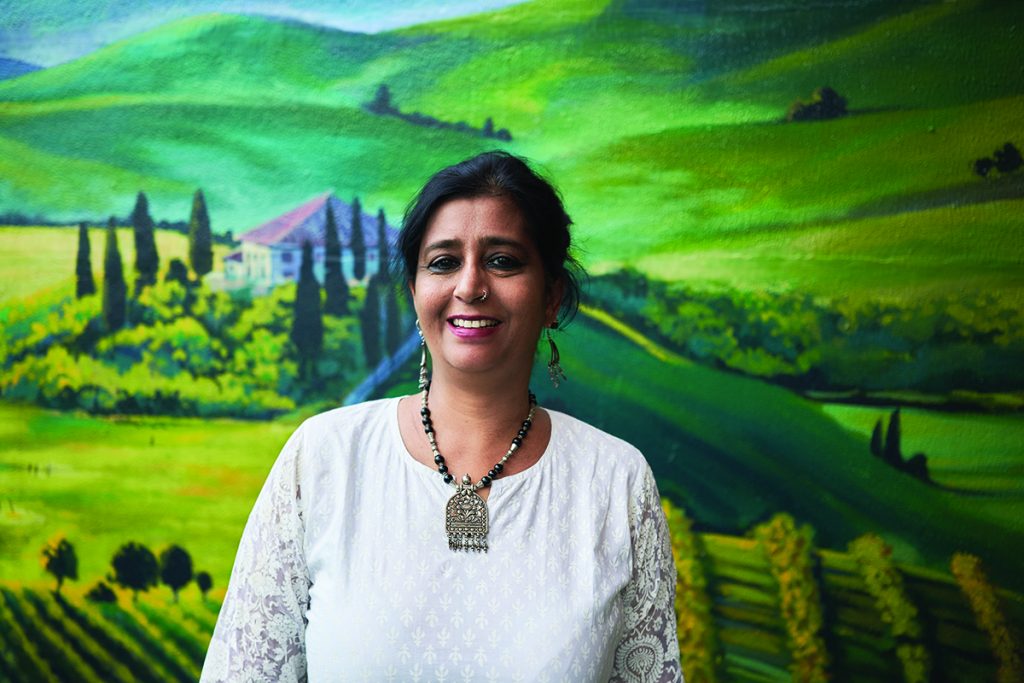Kamalini Natesan is ready to take on the world with her passion for the written and spoken word.
By Aiden Jewelle Gonzales
Born in Delhi, Kamalini Natesan has drawn upon her experiences from around the world – from Bangalore, to Gurgaon, to London and to Norway – to hone her craft, publishing several short stories and poems over the years. However, it was after moving to Thailand six months ago that she published her debut novel, Naked Beneath the Midnight Sun, launching her book on the 16thof October this year at the Neilson Hays Library. A multitalented woman and polyglot, Kamalini firmly believes in the power of language to inculcate and to connect with people.
What is your educational and professional background?
I started in a convent school in Delhi, and later moved to Sri Aurobindo Ashram, Pondicherry. It had a great influence upon me and upon my future professional choices. On my return to Delhi, I studied Indian classical music and continued studying French, as conventional university studies were not for me.
I’ve worked with the French Embassy, in their cultural department, as well as with the Tunisian and Dutch Embassies, as a translator and program officer, respectively. Later I took to teaching French, because it suited my extensive travelling, as well as my core role as parent to two children.
What sparked your interest in literature?
The Ashram school gifted me with an unconventional education, where there were no exams to promote you to the next level. We were encouraged to learn and imbibe naturally, and as I was always drawn to language, literature and music, I excelled at these. This freedom sparked our interest in wide-ranging areas. Music and language permeated the air around. Everyone there spoke at least five languages, quite naturally, and French was our medium of instruction.
How did you begin writing?
Journaling was the first step in self-expression, due to my innate need to share my thoughts. I have diaries dating back to my early childhood and this habit continues to this day. Blogging followed in 2013.
What are the driving philosophies behind the things you write?
Having been brought up in an ambience charged with faith, I was given to looking beyond what meets the eye. I was always searching for meaning in all that went around, in everything that seemed incomprehensible. I practiced Buddhism for 14 years, and that influenced me greatly as well. It instilled in me the belief that we mirror all that is outside of us – so if I wish for harmony and love, I must first be that myself. It taught me to never blame outside circumstances, but to myself enact change.
In what ways has your Indian heritage influenced your writing?
In every possible way: Karma, for one, is a big question that has plagued me – how much of our life do we influence, and how much is destined? That’s a very Hindu concept. While I was raised in a non-religious family, I am essentially Indian, one who embraces all experiences positively. In India, we are surrounded by a kind of chaos which, at the end of the day, comes together in a kind of inexplicable harmony. I carry that with me wherever I am, retaining that quintessential reverence for my own roots.
Tell us about your debut novel, Naked Beneath the Midnight Sun.
The protagonist Suchareeta is a young, self-absorbed girl who needs to get away, and grabs the opportunity to fly to Scandinavia. At that age, Norwegian culture couldn’t be further from Indian culture, and in that dichotomy begins Suchu’s adventure both within and without.
It’s a story that I had to tell; the beatific influence of my travels in Norway left a deep imprint upon my soul. This novel has been inside of me, and I’ve been writing it in my head, since my return in 1986. It is, as is the way with all first novels, semi-autobiographical. I’ve fictionalised parts to add drama to it, but overall, the Norwegian experience has been represented as I felt it then.
Some people argue that fiction does not have the effectiveness of non-fiction in conveying a message to readers. How would you reply to that?
I don’t think truth is just truth when announced as non-fiction alone. There lie many untold truths which resonate with a reader more effectively when wearing the garb of fiction.
I’ve read all sorts of books – both fiction and non-fiction, and depending on the narrative, the craft, and the subject, both are equally riveting to me. I used to read only fiction, thinking it carried a higher entertainment value, but as I grew older, and discovered other areas of interest, I began reading books recommended for their intrinsic knowledge value. Memoirs, some might argue, tread a grey area between fiction and non-fiction, and these remain my favourite.
Which fictional works and authors do you believe have influenced both history and the modern zeitgeist?
There have been many life-changing stories – in modern times, I’d cite Khalid Hussein as an example, a novelist who awoke a knowledge of Afghanistan among ordinary folk. Its range of influence has flown across the globe. There’s Richard Bach, whose reading of Jonathan Livingstone Seagull shifted something in my perception of freedom. Other novelists that have made a huge impact upon the times include George Orwell and Victor Hugo.
A Suitable Boy, by Vikram Seth, could be considered an old-fashioned novel given its length, but that makes it all the more interesting and thereby impactful.
What would you call your biggest challenge to date?
The writing of my novel itself was a big challenge, because, while it flowed out of me in a spontaneous burst, I had to rewrite many parts to make it palatable to a publisher. I was rejected by a few, but I didn’t give up despite all odds. I was determined to have it shine in the light of day. Other than that, to be able to write a full-fledged novel that is a story worth telling is honestly the biggest challenge apart from continuing to believe in one’s craft. The internal strife is far greater than the external.
What do you enjoy most about your career?
I’m not just a writer, I also teach French, which is something I absolutely love. These two big loves tie in beautifully together and what I like above all is the human connection. When I write, I’m externalising my thoughts and ideas, and I’m connecting with those who read it. When I teach, I also touch others via the language. Both use language as their medium of expression and that is a kind of high that’s incomparable to any other.
What would you consider your greatest accomplishment, and conversely, do you have any regrets?
My debut novel and the nurturing of my two kids. They are independent individuals with very strong views of the world they wish to live in.
I regret not having brought out my debut novel sooner; not making the most of the time given to me and working a lot harder. I also regret not bringing out a CD of my own songs. However, I still have time, and I’m not about to give up on this last one yet. I’m busy writing my second novel now.
Where do you see yourself in the future, both personally and professionally?
I see myself running a book café in the hills with a rolling menu, and running writer’s workshops. Cooking is a huge passion, as is meeting other budding writers, sharing ideas, and aiding the creative process.
I hope to write many more stories and novels, because that is something I can do anytime, from anywhere. Neither is this ambition time-bound nor is it dependent upon external vagaries of weather and venues.
To read more of Kamalini’s written works and thoughts, check out: www.lazychillies.wordpress.com






